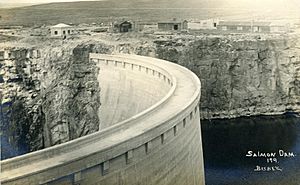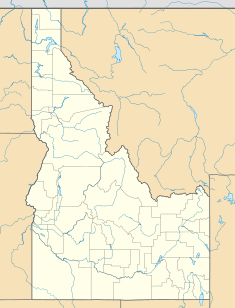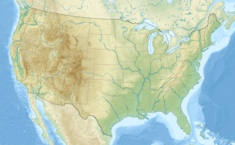Salmon Falls Dam facts for kids
Quick facts for kids Salmon Falls Dam |
|
|---|---|

Salmon Falls Dam shortly after completion in 1910
|
|
|
Location in Idaho##Location in United States
|
|
| Country | United States |
| Location | Twin Falls County, Idaho |
| Coordinates | 42°12′43″N 114°44′04″W / 42.21194°N 114.73444°W |
| Purpose | Irrigation |
| Opening date | 1910 |
| Owner(s) | Salmon River Canal Company |
| Dam and spillways | |
| Type of dam | Concrete gravity arch |
| Impounds | Salmon Falls Creek |
| Height | 217 ft (66 m) |
| Length | 450 ft (140 m) |
| Reservoir | |
| Creates | Salmon Falls Creek Reservoir |
| Total capacity | 230,650 acre⋅ft (284,500 dam3) |
| Catchment area | 1,610 sq mi (4,200 km2) |
| Surface area | 3,400 acres (1,400 ha) |
| Maximum length | 14 mi (23 km) |
The Salmon Falls Dam is a large dam built across Salmon Falls Creek in Twin Falls County, Idaho, in the United States. It's about 28 miles (45 km) southwest of Twin Falls. This impressive structure is 217 feet (66 m) tall and 450 feet (140 m) long.
The dam creates the Salmon Falls Creek Reservoir, which can hold a huge amount of water – up to 230,650 acre-feet (0.28450 km3). When the reservoir is full, it stretches for 17 miles (27 km) and covers 3,400 acres (1,400 ha). The dam helps control water from a large area of 1,610 sq mi (4,200 km2).
The Salmon Falls Dam was built in 1910. Its main job is to store water for irrigation, which means providing water to farms. It also helps prevent floods. The dam has stopped floodwaters twice, in 1984 and 2017. The Salmon Falls Creek Reservoir is also a popular spot for fun activities like fishing. Many people think it's one of the best fishing places in southern Idaho.
When it was built, the Salmon Falls Dam was the third-largest dam in the world! It was part of a big project to bring water to dry land. However, this project faced some challenges. There wasn't as much water as people expected, and some water leaked through the lava rock used to build the dam.
A Historic Structure
The Salmon Falls Dam is an important piece of history. In 2009, it was added to the National Register of Historic Places. This means it's recognized as a special place worth protecting. The listing includes the dam itself, along with one building and seven other structures nearby. These structures cover an area of 10 acres (4.0 ha).
Images for kids
 | Tommie Smith |
 | Simone Manuel |
 | Shani Davis |
 | Simone Biles |
 | Alice Coachman |






